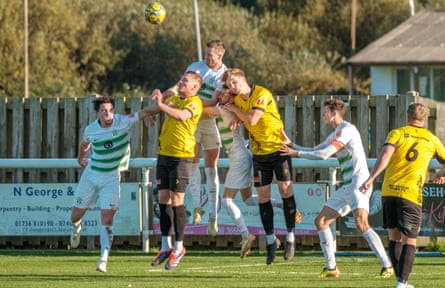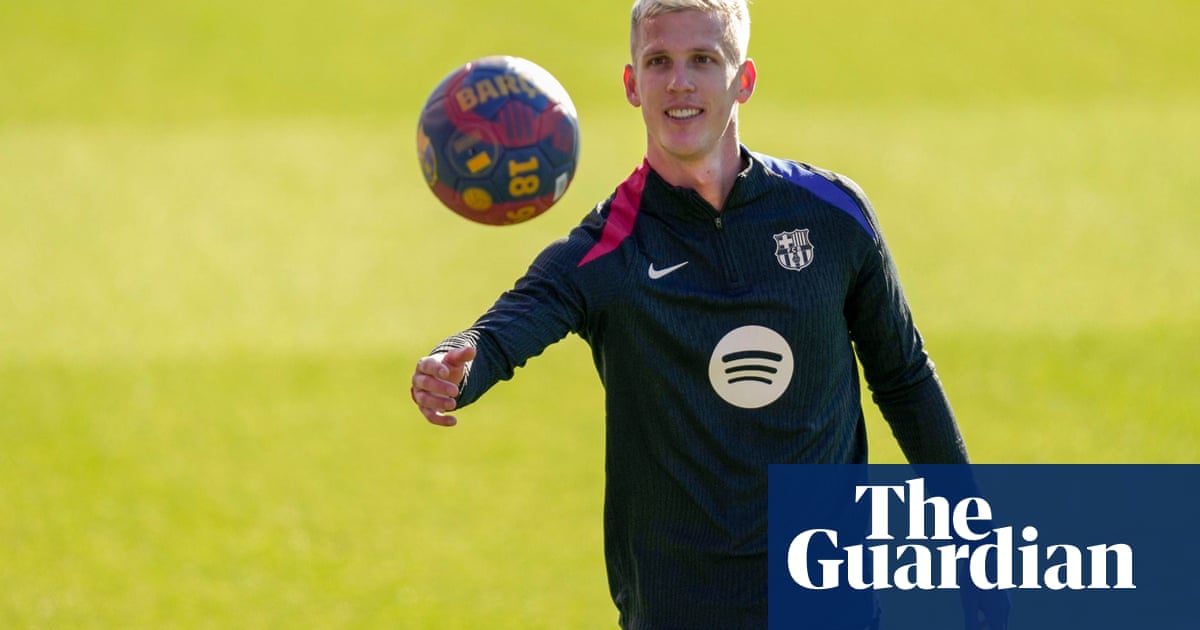Perched on a hill overlooking the tip of Cornwall with the Atlantic stretching far beyond, Mousehole AFC is a world away from top-flight football.
The most westerly club in the English leagues is staffed mainly by volunteers, is financed by a campsite in a field next door and serves only locally made pasties in the tea hut – although it did once host a friendly against Manchester United in 1987.
Despite its unlikely location down a bumpy, potholed track just a few miles from Land’s End, the club is riding a wave of winning results, having been promoted twice in three years and pushing for another promotion this season.
The club’s success is attracting talented young players from London and other big cities, who come to fulfil their footballing dreams amid the spectacular scenery of west Cornwall.

Neither Julio Fresnada, 20, nor Ross Derham, also 20, had even heard of Mousehole before being scouted by the club last season. They grew up playing in the academies of big clubs such as Reading and Watford, but have been drawn way out west by an opportunity they say is rare at this level of football.
“In London we would maybe only get to train once or twice a week. Here, we train five or six times a week, plus matches. It might be a small place but joining Mousehole is the biggest thing that has happened to us,” says Derham, a midfielder, who is enjoying his quiet Cornish life.
“There are no distractions here. It’s so beautiful, and so peaceful,” says Derham. “My mum cried when she came down and met everyone at the club, she knows I am safe here.”
The tiny village of Mousehole (pronounced mowzel) is famous for its picture-postcard harbour, as well as its poignant Christmas light display that honours the crew of the Penlee lifeboat, who were all lost at sea during a rescue in December 1981.
It is home to about 500 people, but Mousehole’s football team is now playing towns with populations that are 50 times its size.
It is only two promotions away from the National League South, after winning the Western League in 2021 and then moving to the Southern League Division One South last year.
“People who don’t know Mousehole think they are coming to the end of the world when they drive down that lane. They expect it to be the kind of place where cows are being shooed off the pitch before the match,” says Ben Gibson, one of the club’s directors, who lives near the ground.
“When they get off the coach and see what it’s really like, they can’t believe it. We are a village club, but we are playing a standard of football that is way beyond what anyone would imagine they might find here.”
Jake Ash, Mousehole’s team manager, says the club has to do things differently to attract players.
“Given our location, we’ve got to be unique – and what we offer is the quality of our training and how we treat our players,” he says. “The club is still run by the same people who’ve run it for decades. We’ve kept true to ourselves and who we are.”
Mousehole’s location, however, brings unavoidable financial challenges for the club. Away games are already lengthy and expensive – attending every fixture in the season requires 7,615 miles of travel.
“We’re progressing really well and we want to keep going as far as we can, but it’s becoming financially harder every step we go up. The costs are just phenomenal,” says Billy Jacka, the club’s chair.

The small club has another big problem in the road that leads to the ground.
after newsletter promotion
In the build-up to Mousehole’s recent game against Melksham Town, the Wiltshire team’s coach got stuck in the narrow lane and then struggled over the obstacle-course of potholes littering the final yards to the ground.
Campervans and motorhomes also find it difficult to navigate their way to the campsite next door.
The campsite is Mousehole’s main source of revenue, and without improvements to its infrastructure, the ability to fund future promotions could be at risk.
“Other clubs have sponsors or sugar daddies to pay the bills. Well, our campsite is our sugar daddy,” says Jacka, a retired train crew manager.
“We have to find a way to make the club, and the campsite, financially sustainable – because we can only progress on the pitch as far as we can support the team financially off the pitch.”
The club is looking for ways to fund the construction of a new access road that would bypass the village and connect the ground directly to the main Land’s End to Penzance road.
“A new road would be huge for the club and for the campsite – we could open up to more campervans and other businesses that would bring in more money.
“We have planning permission for the road, we just don’t have the funds to build it,” says Jacka.
Brian Richardson, 77, is a stalwart of the club who refuses to give up hope, whatever challenges lie ahead. He grew up in the village and has watched the club rise up through the leagues.
“Look at where we have got to – nobody ever thought Mousehole would get this far,” he says.
“I don’t know how far we can keep going or how far we can afford to keep going. But if I know anything about this club and the people who are involved with it – it’s that dreams really can come true.”


.png) 2 months ago
24
2 months ago
24













































